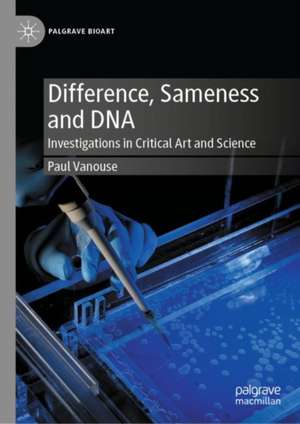Difference, Sameness and DNA: Investigations in Critical Art and Science: Palgrave BioArt
Autor Paul Vanouseen Limba Engleză Hardback – 12 mar 2024
Preț: 318.66 lei
Nou
Puncte Express: 478
Preț estimativ în valută:
60.98€ • 63.82$ • 50.75£
60.98€ • 63.82$ • 50.75£
Carte tipărită la comandă
Livrare economică 01-15 aprilie
Preluare comenzi: 021 569.72.76
Specificații
ISBN-13: 9783031470721
ISBN-10: 3031470729
Pagini: 137
Ilustrații: XXII, 137 p. 45 illus., 41 illus. in color.
Dimensiuni: 148 x 210 mm
Greutate: 0.35 kg
Ediția:2024
Editura: Springer International Publishing
Colecția Palgrave Macmillan
Seria Palgrave BioArt
Locul publicării:Cham, Switzerland
ISBN-10: 3031470729
Pagini: 137
Ilustrații: XXII, 137 p. 45 illus., 41 illus. in color.
Dimensiuni: 148 x 210 mm
Greutate: 0.35 kg
Ediția:2024
Editura: Springer International Publishing
Colecția Palgrave Macmillan
Seria Palgrave BioArt
Locul publicării:Cham, Switzerland
Cuprins
1. Introduction.- 2. Making Difference.- 3. BLOOD, COMPARING: Relative Velocity Inscription Device.- 4. PATTERN, IDENTIFYING: Latent Figure Protocol.- 5. EVIDENCE, PERFORMING: Suspect Inversion Center and Deep Woods PCR.- 6. SPIT, ANONYMIZING: America Project.- 7. MATTER, MAPPING: Ocular Revision.- 8. SWEAT, (RE)MATERIALIZING: Labor.
Notă biografică
Paul Vanouse is an artist, SUNY Distinguished Professor and founding director of the Coalesce Center for Biological Art at the University at Buffalo, USA. A pioneer of bio-media art, his artwork employs molecular biology techniques to challenge entrenched notions of individual, racial, and national identity, and the cultural authority of DNA. His projects have been exhibited in 30 countries and widely across the US. Venues have included Albright-Knox Art Gallery (Buffalo), New Museum (New York), Andy Warhol Museum (Pittsburgh), Walker Art Center (Minneapolis), Henry Art Gallery (Seattle), Museo Nacional de Bellas Artes (Buenos Aires), Louvre (Paris), Haus Der Kulturen Der Welt and Schering Stiftung (Berlin), ZKM (Karlsruhe), and TePapa Museum (Wellington). His recent, multi-sensory, bio-media artwork, "Labor", received a Golden Nica at Prix Ars Electronica.
Textul de pe ultima copertă
Preface by Jens Hauser
“A truly remarkable book by a pioneering bioartist that challenges us to critically reevaluate our notions of genetic and biological identities.”
- Gunalan Nadarajan, Dean Emeritus and Professor, Penny W. Stamps School of Art and Design, University of Michigan, USA
This book chronicles over two decades of critical, artistic investigations by Paul Vanouse. His bio-media artwork utilizes the tools of the life sciences reflexively, to challenge tropes and cultural politics surrounding DNA, biotechnology, and life itself. DNA has been called a “Truth Machine”, “God’s Blueprint”, the “Code of Codes” and the “Book of Life”. Vanouse’s work explores questions at the heart of such evocative metaphor and hyperbole: how does DNA link us together, how does it differentiate us and how are the grand metaphors, which grant DNA complete centrality, misconstruing the complexity of life. Furthermore, how do technologies of genetic typing and identification fit within a broader cultural and political history of difference making, particularly the construction of race. Melding critical theory, artist’s manifesto, participatory observation and histories of the sciences, this book offers insight into both an artistic practice and the bio-techno-sciences it interrogates.
Paul Vanouse is an artist, SUNY Distinguished Professor and founding director of the Coalesce Center for Biological Art at the University at Buffalo, USA. A pioneer of bio-media art, his artwork employs molecular biology techniques to challenge entrenched notions of individual, racial, and national identity, and the cultural authority of DNA. His projects have been exhibited in 30 countries and widely across the US. Venues have included Albright-Knox Art Gallery (Buffalo), New Museum (New York), Andy Warhol Museum (Pittsburgh), Walker Art Center (Minneapolis), Henry Art Gallery (Seattle), Museo Nacional de Bellas Artes (Buenos Aires), Louvre (Paris), Haus Der Kulturen Der Welt and Schering Stiftung (Berlin), ZKM (Karlsruhe), and TePapa Museum (Wellington). His recent, multi-sensory, bio-media artwork, "Labor", received a Golden Nica at Prix Ars Electronica.
Caracteristici
Challenges tropes and cultural politics surrounding DNA, biotechnology, and life itself Melds theory, artist’s manifesto, participatory observation and histories of the sciences Explores how genetic typing and identification fit within a broader cultural and political history of difference making

